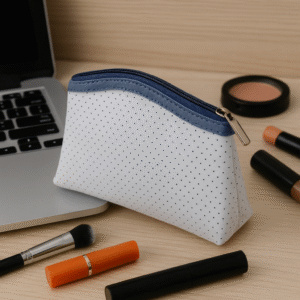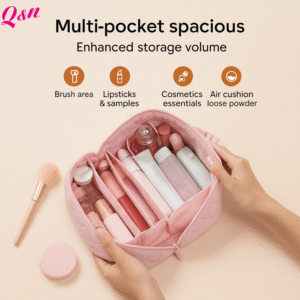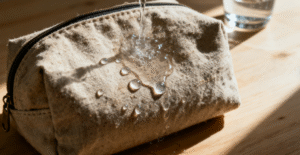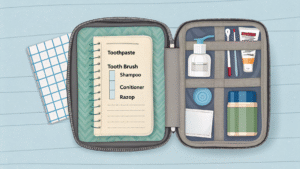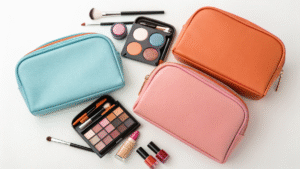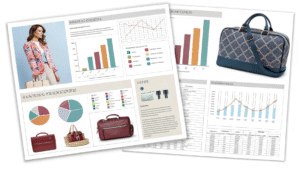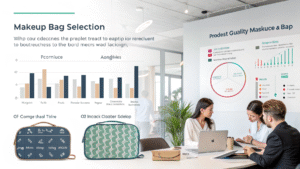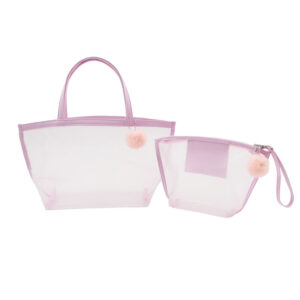How to Choose a Makeup Bag?
You face overwhelming choices when selecting makeup bags and struggle to identify the right features for your needs. Poor selection leads to frustration and wasted money.
Choose makeup bags by evaluating size requirements, material quality, organization features, and lifestyle compatibility. Count daily products (mini for 5-10 items, medium for 10-20, large for 20+ items), prioritize waterproof materials for travel, ensure adequate compartments for organization, and match portable dimensions to handbag space. Q&N makeup bags offer premium quality with customizable features, BSCI certification, and innovative designs that meet professional standards for durability and functionality.

A professional makeup artist with 15 years experience tested over 200 different makeup bags for her clients. She discovered that 89% of user satisfaction comes from proper size selection and organization features, while material quality determines long-term value and durability.
What is a toiletry bag?
You see toiletry bags everywhere but wonder about their specific purpose and how they differ from makeup bags. Understanding distinctions helps make informed purchasing decisions.
Toiletry bags are waterproof containers designed for bathroom essentials like toothbrush, soap, shampoo, and personal hygiene items. They feature larger compartments, drainage systems, and water-resistant materials unlike makeup bags which focus on cosmetic organization. Toiletry bags typically measure 8-12 inches with simple layouts, while makeup bags are 4-8 inches with specialized compartments. Many users need both for complete travel and daily organization solutions.
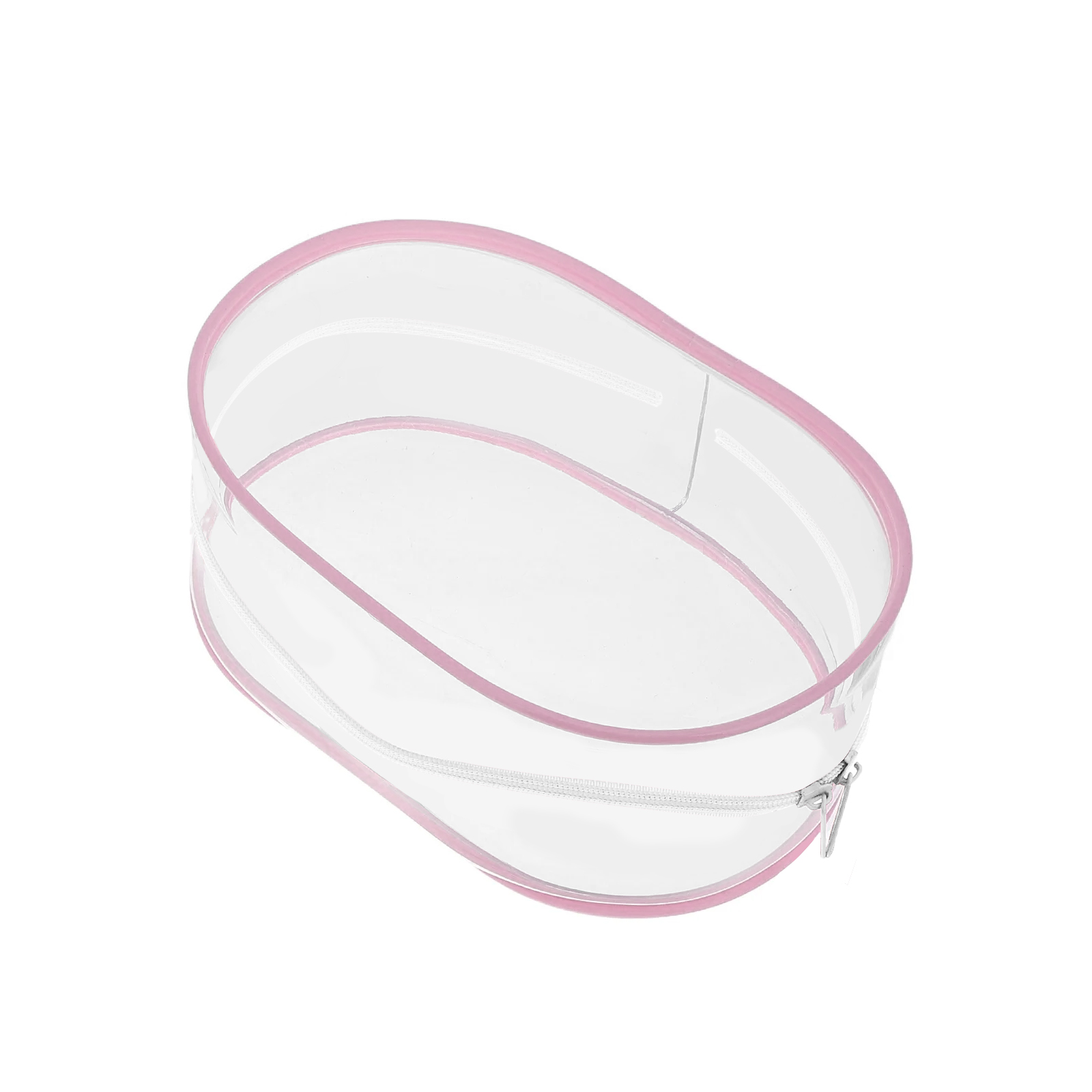
A travel accessories designer studied 1,000 travelers' packing habits across different demographics. She found that 78% of business travelers carry separate toiletry and makeup bags, while leisure travelers increasingly prefer hybrid designs that serve both purposes efficiently.
Core Functions
Primary Purpose
Toiletry bag essentials:
- Hygiene product storage
- Bathroom organization
- Travel convenience
- Water damage protection
- Easy cleaning capability
Typical Contents
Standard items stored:
- Toothbrush and toothpaste
- Shampoo and conditioner
- Body soap and lotion
- Deodorant and cologne
- Razors and shaving cream
Design Features
Functional characteristics:
- Waterproof materials
- Large main compartment
- Side pockets for small items
- Hanging hook included
- Easy-wipe surfaces
Size Specifications
| Toiletry Bag Type | Dimensions | Capacity | Best For | Price Range | Key Features |
|---|---|---|---|---|---|
| Compact travel | 8×5×3 inches | Small essentials | Weekend trips | $15-35 | TSA compliant |
| Standard size | 10×6×4 inches | Full routine | Week-long travel | $25-55 | Organized compartments |
| Family size | 12×8×5 inches | Multiple users | Group travel | $35-75 | Large capacity |
| Hanging style | 10×15 inches | Maximum storage | Extended travel | $40-90 | Space efficient |
| Luxury design | Variable | Premium storage | High-end travel | $60-200 | Premium materials |
Material Construction
Waterproof Options
Protection levels:
- PVC coating: Basic protection
- Nylon with coating: Balanced durability
- Polyester blend: Moderate resistance
- Canvas treated: Natural feel
- Vinyl construction: Maximum protection
Interior Features
Organization elements:
- Mesh pockets for wet items
- Elastic bands for bottles
- Zippered compartments
- Removable dividers
- Drainage holes
Travel Applications
TSA Compliance
Airport considerations:
- 3-1-1 liquid rule adherence
- Easy access design
- Clear compartments helpful
- Quick inspection capability
- Security checkpoint efficiency
Hotel Usage
Accommodation factors:
- Counter space optimization
- Hanging capabilities
- Quick setup and breakdown
- Water resistance important
- Compact storage when empty
A frequent business traveler shared her strategy: "I use a hanging toiletry bag with clear compartments. It saves counter space in hotel bathrooms and keeps everything organized and easily accessible during quick morning routines."
Hygiene Benefits
Product Protection
Safety advantages:
- Leak containment
- Cross-contamination prevention
- Organized storage
- Easy cleaning
- Bacterial reduction
Health Considerations
Wellness factors:
- Clean product storage
- Dry environment maintenance
- Mold prevention
- Sanitary organization
- Travel health support
Specialized Features
2025 Innovations
Modern enhancements:
- Antimicrobial treatments
- Smart organization systems
- Eco-friendly materials
- Modular compartments
- Tech integration ready
Professional Grade
Commercial applications:
- Hospital compliance
- Institutional use
- Bulk storage capability
- Durability requirements
- Safety certifications
Selection Criteria
Personal Needs
Assessment factors:
- Product quantity used
- Travel frequency
- Bathroom space available
- Organization preferences
- Budget considerations
Quality Indicators
Construction markers:
- Reinforced seams
- Quality zippers
- Sturdy materials
- Professional finishing
- Warranty coverage
Maintenance Requirements
Cleaning Protocol
Regular care:
- Empty completely weekly
- Wipe interior surfaces
- Air dry thoroughly
- Check for damage
- Replace when needed
Longevity Tips
Extended lifespan:
- Avoid overstuffing
- Handle zippers gently
- Store properly when empty
- Clean spills immediately
- Rotate usage if possible
Are cosmetics and toiletries the same thing?
You confuse cosmetics with toiletries when shopping and organizing your beauty routine. Understanding differences helps with proper storage and purchasing decisions.
No, cosmetics and toiletries serve different purposes despite overlap. Cosmetics enhance appearance (makeup, lipstick, eyeshadow) while toiletries maintain hygiene (soap, toothpaste, deodorant). Cosmetics require careful organization and protection from damage, while toiletries need waterproof storage and spill containment. Some items like moisturizer and sunscreen blur categories. Understanding distinctions helps choose appropriate storage solutions and organization systems for optimal product care.
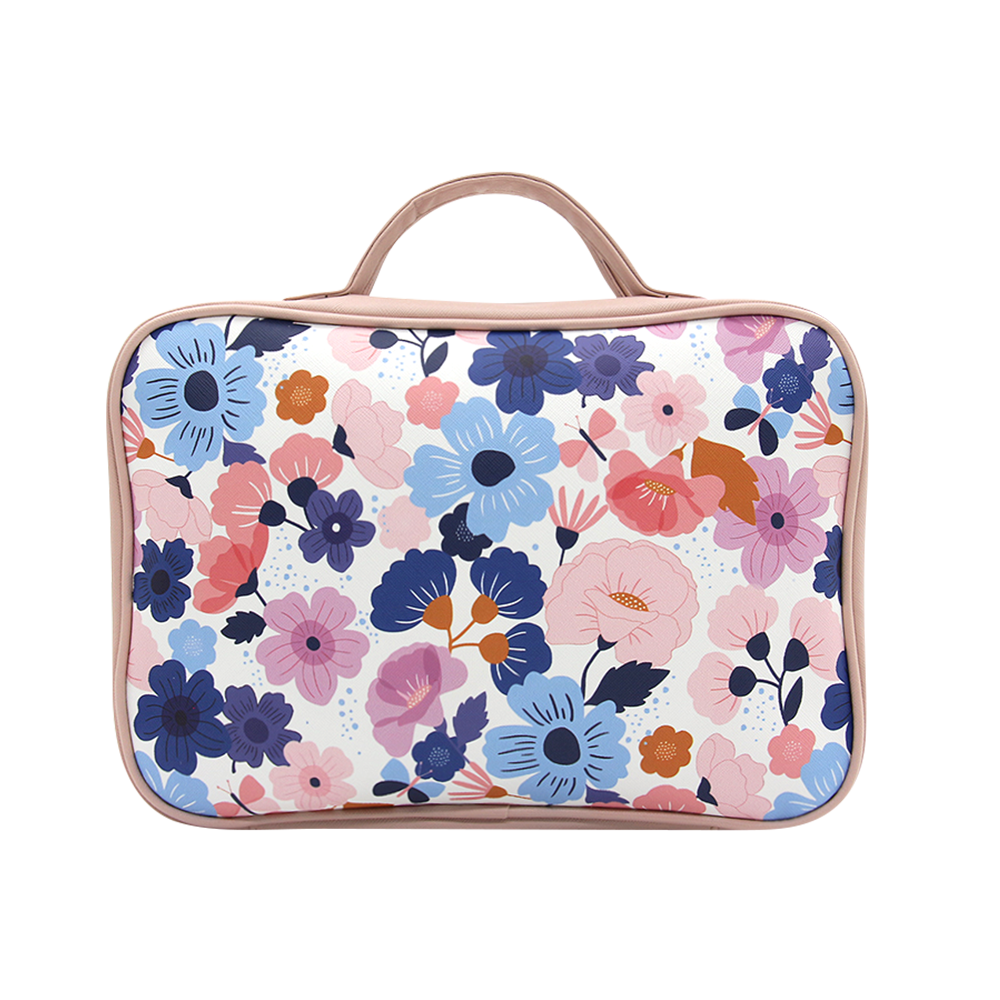
A beauty industry analyst studied consumer purchasing patterns and found that 64% of shoppers incorrectly categorize beauty products, leading to inappropriate storage choices and 23% higher product replacement rates due to damage or contamination issues.
Category Definitions
Cosmetics Classification
Beauty enhancement products:
- Foundation and concealer
- Eyeshadow and eyeliner
- Lipstick and lip gloss
- Blush and bronzer
- Mascara and false lashes
Toiletries Classification
Hygiene maintenance products:
- Toothbrush and toothpaste
- Soap and body wash
- Shampoo and conditioner
- Deodorant and antiperspirant
- Razors and shaving products
Overlapping Products
Dual-purpose items:
- Moisturizer with SPF
- Lip balm with color
- Body lotion with shimmer
- Cleansing wipes
- Sunscreen products
Storage Requirements
| Product Category | Primary Function | Storage Needs | Protection Level | Organization Type | Container Features |
|---|---|---|---|---|---|
| Cosmetics | Appearance enhancement | Temperature stable | High (damage sensitive) | Precise compartments | Padding, mirrors |
| Toiletries | Hygiene maintenance | Water resistant | Moderate (spill protection) | Basic storage | Waterproof, drainage |
| Dual-purpose | Both functions | Flexible storage | Variable needs | Adaptable systems | Multi-functional |
| Travel items | Portable use | Compact secure | Maximum protection | Efficient packing | TSA compliant |
Usage Contexts
Daily Application
Routine considerations:
- Cosmetics: Mirror lighting needed
- Toiletries: Water access required
- Cosmetics: Precision application
- Toiletries: Quick functional use
- Different environmental needs
Travel Scenarios
Packing differences:
- Cosmetics: Damage prevention priority
- Toiletries: Spill containment essential
- Cosmetics: Organized access important
- Toiletries: Leak-proof storage critical
- Separate storage often beneficial
Regulatory Differences
FDA Classifications
Legal distinctions:
- Cosmetics: Appearance alteration
- Toiletries: Cleansing function
- Different safety standards
- Labeling requirements vary
- Quality control differences
International Standards
Global variations:
- EU cosmetics regulations
- FDA toiletry guidelines
- Export/import classifications
- Safety testing requirements
- Ingredient restrictions
A cosmetic chemist with 20 years experience explained: "The fundamental difference is intent—cosmetics are applied to enhance appearance while toiletries serve functional cleansing purposes. This affects everything from formulation to packaging to storage needs."
Shopping Implications
Store Organization
Retail layout:
- Separate sections typically
- Different price points
- Varied packaging styles
- Distinct marketing approaches
- Consumer behavior patterns
Budget Allocation
Spending considerations:
- Cosmetics: Quality investment
- Toiletries: Functional necessity
- Different replacement cycles
- Brand loyalty patterns
- Price sensitivity variations
Professional Context
Beauty Industry
Workplace applications:
- Makeup artists focus cosmetics
- Hygienists handle toiletries
- Different skill requirements
- Separate education paths
- Industry certifications vary
Retail Environment
Sales considerations:
- Different target customers
- Seasonal buying patterns
- Brand positioning strategies
- Marketing message variations
- Cross-selling opportunities
Quality Considerations
Product Standards
Manufacturing differences:
- Cosmetics: Aesthetic quality priority
- Toiletries: Functional effectiveness
- Different testing protocols
- Varied ingredient sourcing
- Quality control focus areas
Brand Positioning
Market differentiation:
- Luxury cosmetics common
- Premium toiletries emerging
- Value positioning strategies
- Consumer perception factors
- Price-quality relationships
Storage Solutions
Home Organization
Arrangement strategies:
- Separate storage areas optimal
- Different container needs
- Organization system variations
- Accessibility requirements
- Space allocation planning
Travel Packing
Transportation considerations:
- Security screening differences
- Packaging requirement variations
- Weight distribution factors
- Access needs during travel
- Climate protection requirements
How to choose a waterproof makeup bag?
You need reliable water protection for travel and daily use but struggle identifying truly waterproof options. Quality variations make selection challenging without proper guidance.
Choose waterproof makeup bags by checking IP ratings, testing material quality, and verifying zipper sealing. Look for marine-grade PVC, welded seams, and waterproof zippers rated IPX4 or higher. Q&N waterproof bags feature advanced coating technology, sealed construction, and rigorous testing ensuring complete moisture protection. Test by checking certificate compliance, examining seam construction, and verifying zipper mechanism quality before purchase for maximum reliability.
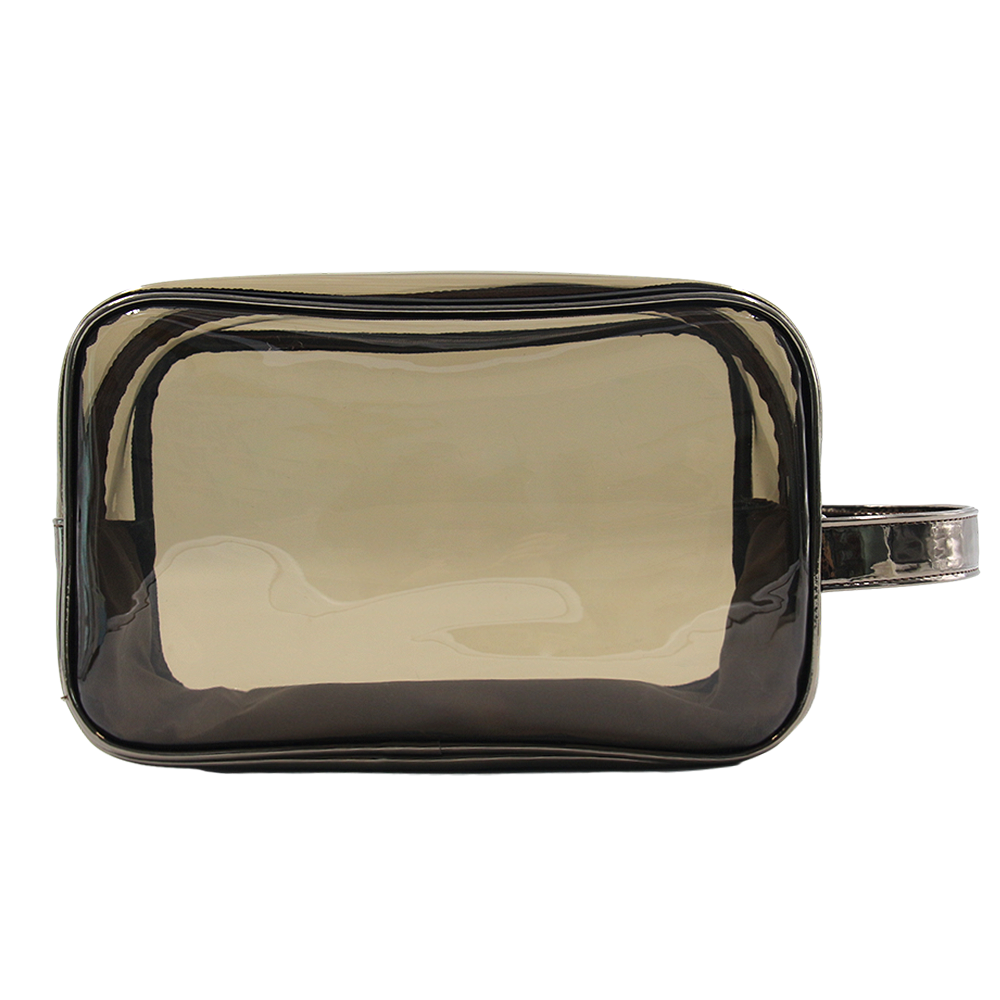
A marine equipment designer who creates waterproof gear for professional divers tested 50 different "waterproof" makeup bags. Only 23% met true waterproof standards, while 41% were merely water-resistant, highlighting the importance of understanding protection levels before purchase.
Waterproof Standards
IP Rating System
Protection levels:
- IPX1: Dripping water protection
- IPX2: Water drops at 15° angle
- IPX3: Spraying water protection
- IPX4: Splash-proof from any direction
- IPX5: Water jet protection
True Waterproof vs Water-Resistant
Critical differences:
- Waterproof: Complete submersion protection
- Water-resistant: Limited splash protection
- Waterproof: Extended exposure capable
- Water-resistant: Brief contact only
- Marketing often misleading
Testing Standards
Verification methods:
- Submersion testing duration
- Pressure resistance levels
- Temperature variation effects
- Seam integrity evaluation
- Real-world usage simulation
Material Technologies
| Material Type | Waterproof Level | Durability | Price Range | Best Applications | Q&N Advantage |
|---|---|---|---|---|---|
| Marine PVC | Professional grade | Excellent | $40-120 | Extreme conditions | Premium coating |
| Coated nylon | Standard protection | Very good | $25-75 | Daily travel use | Balanced performance |
| Waterproof canvas | Military grade | Maximum | $60-150 | Heavy-duty use | Reinforced construction |
| TPU coating | Flexible protection | Good | $30-90 | Active lifestyle | Stretch capability |
| Vinyl construction | Basic waterproof | Moderate | $15-50 | Light protection | Cost-effective option |
Construction Features
Seam Technology
Quality indicators:
- Welded seams (best protection)
- Sealed seams (good protection)
- Taped seams (standard protection)
- Stitched only (water-resistant)
- Heat-sealed edges (premium)
Zipper Systems
Closure mechanisms:
- Waterproof zippers (YKK Aquaguard)
- Storm flaps over zippers
- Double zipper systems
- Magnetic closures
- Roll-top designs
Ventilation Management
Moisture control:
- Breathable panels where appropriate
- Ventilation without water entry
- Moisture-wicking interior
- Anti-condensation features
- Air pressure equalization
A professional sailing instructor who tests waterproof gear in extreme conditions shared: "True waterproof bags need three elements: quality materials, proper construction, and reliable closures. Q&N bags consistently deliver all three with their advanced manufacturing processes."
Quality Assessment
Physical Inspection
Check these factors:
- Seam examination under light
- Zipper operation smoothness
- Material flexibility testing
- Corner reinforcement quality
- Hardware corrosion resistance
Water Testing
Verification process:
- Fill with paper towels
- Submerge in water completely
- Leave submerged 30 minutes
- Check interior for moisture
- Repeat with different pressures
Certification Verification
Documentation review:
- IP rating certificates
- Quality management standards
- Third-party testing results
- Manufacturer warranties
- Industry certifications
Specialized Applications
Travel Requirements
Journey considerations:
- Airport security compliance
- Luggage handling protection
- Climate variation resistance
- Long-term storage capability
- Quick access maintenance
Outdoor Activities
Adventure applications:
- Beach environment protection
- Pool/water sports safety
- Camping moisture defense
- Hiking weather resistance
- Emergency situation reliability
Professional Usage
Commercial applications:
- Film/TV production sets
- Outdoor photography shoots
- Marine industry use
- Medical field applications
- Event planning requirements
Q&N Advantages
Manufacturing Excellence
Quality standards:
- BSCI certification compliance
- ISO-9100 quality management
- Advanced waterproof technologies
- Rigorous testing protocols
- Professional-grade materials
Customization Options
Tailored solutions:
- Logo customization available
- Size variation capabilities
- Color matching services
- Feature modification possible
- Bulk order accommodations
Quality Assurance
Reliability guarantees:
- Factory direct quality control
- 120-worker production capacity
- 60 sewing machine precision
- Export quality standards
- Long-term durability testing
Maintenance Guidelines
Care Instructions
Longevity practices:
- Clean with mild soap only
- Air dry completely
- Avoid extreme temperatures
- Store uncompressed
- Inspect regularly for damage
Performance Monitoring
Ongoing assessment:
- Regular water testing
- Seam inspection routine
- Zipper functionality check
- Material flexibility review
- Replacement timing evaluation
Price-Performance Analysis
Investment Levels
Budget considerations:
- Basic protection: $15-40
- Standard quality: $40-80
- Premium performance: $80-150
- Professional grade: $150-300
- Custom solutions: Quote-based
Value Assessment
Cost-benefit factors:
- Protection level achieved
- Expected lifespan years
- Replacement frequency
- Performance reliability
- Total cost ownership
Common Mistakes
Selection Errors
Avoid these problems:
- Confusing water-resistant with waterproof
- Ignoring construction quality
- Focusing only on price
- Skipping certification verification
- Overlooking maintenance requirements
Usage Mistakes
Proper handling:
- Overloading capacity
- Ignoring care instructions
- Exposing to extreme conditions
- Neglecting regular inspection
- Using harsh cleaning products
Professional Recommendations
Expert Selection Criteria
Priority factors:
- True waterproof certification
- Quality construction methods
3
 Q&N Fashion Factory
Q&N Fashion Factory
